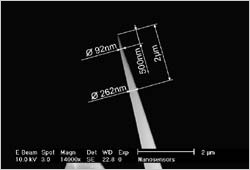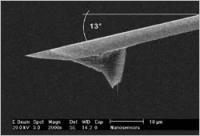| NanoWorld |


| Registration Date | 14 Mar 2016 |
| Share |
Electronics Sensor Product Number : AR5T-NCHR-20
Afm TipAluminum
Al Nanostructure Coating CAS Number : 7429-90-5length of the high aspect ratio portion of the tip > 2 µm typical aspect ratio at 2 µm in the order of 7:1 (when viewed from side as well as along cantilever axis) high aspect ratio portion of the tip tilted 13° to the center axis of the cantilever half cone angle at 2 µm of the high aspect ratio portion typically < 5° guaranteed tip radius of curvature < 15 nm highly doped silicon to dissipate static charge high mechanical Q-factor for high sensitivity
NANOSENSORS™ AR5T-NCHR sensors are designed for non-contact mode or Tapping Mode AFM (also known as: attractive or dynamic mode). This sensor type combines high operation stability with outstanding sensitivity and fast scanning ability.For measurements on samples with sidewall angles approaching 90° NANOSENSORS™ produces specially tailored tips. These tips are FIB (Focused Ion Beam) milled to achieve a high aspect ratio portion at the end of the common silicon tip. This subtractive method of producing the high aspect ratio needle offers the advantage of high lateral stiffness and rigidity of the tip.On the model AR5T the last 2 µm of the tip are tilted 13° to the center axis of the cantilever. With this feature the tilt angle of the cantilever caused by the mount of the AFM head (commonly 13°) will be compensated. Now, nearly vertical sidewalls can be measured offering a symmetrical scan.The reflex coating is a 30 nm thick aluminum coating on the detector side of the cantilever which enhances the reflectivity of the laser beam by a factor of about 2.5. Furthermore it prevents light from interfering within the cantilever. The virtually stress-free coating is bending the cantilever less than 2% of the cantilever length.